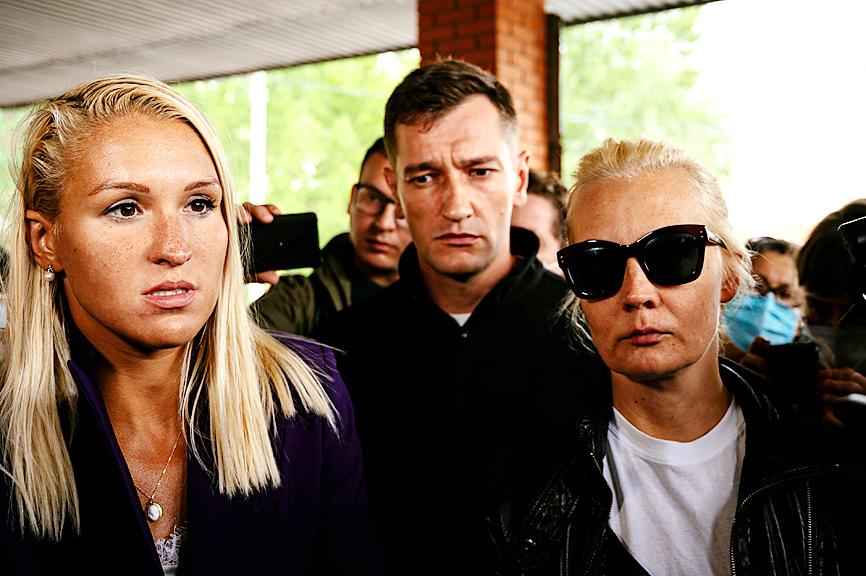Aides to Russian opposition figure Alexei Navalny yesterday accused doctors of risking his life by refusing to allow him to be moved from a Siberian hospital after his suspected poisoning.
Navalny, a 44-year-old lawyer and anti-corruption campaigner who is among Russian President Vladimir Putin’s fiercest critics, was in a coma in intensive care in Omsk after he lost consciousness while on a flight and his plane made an emergency landing on Thursday.
Aides say they believe he was poisoned and that something was put in his tea at an airport cafe.

Photo: AFP
An air ambulance was on its way to fly him to Germany for treatment but Navalny’s spokeswoman Kira Yarmysh said doctors were refusing to allow him to be moved.
“The chief doctor stated that Navalny is not transportable” because his condition was “unstable,” Yarmysh said on Twitter, calling the decision “a direct threat to his life.”
“The ban on the transportation of Navalny is an attempt on his life, which is being made right now by doctors and the deceitful authorities who sanctioned it,” Yarmysh said.
Doctors have said his condition was serious but stable and have yet to make any official diagnosis.
Navalny’s team said earlier that the hospital in Omsk was ill-equipped and his doctor, Anastasia Vasilyeva, said she had asked for the Kremlin’s help to transfer him to a European clinic.
Yarmysh said an air ambulance dispatched to fly him to Germany for treatment was due to land shortly.
It left Nuremberg early yesterday after German Chancellor Angela Merkel extended an offer of treatment.
Foreign leaders including Merkel and French President Emmanuel Macron have voiced concern for Navalny, who has faced repeated physical attacks and prosecutions in more than a decade of opposition to Russian authorities.
He lost consciousness shortly after his plane took off on Thursday from Tomsk in Siberia, where he was working to support opposition candidates ahead of regional elections next month.
Yarmysh said he had seemed “absolutely fine” before boarding the flight and had only consumed a cup of tea at the airport.
She said she was sure he had suffered from an “intentional poisoning” and put the blame on Putin.
“Whether or not he gave the order personally, the blame lies with him,” she said.
Kremlin spokesman Dmitry Peskov said claims of poisoning were “only assumptions” until tests proved otherwise.
He wished Navalny a “speedy recovery” after pledging Kremlin help to secure him treatment abroad if needed.
EU High Representative for Foreign Affairs and Security Policy Josep Borrell said that “those responsible must be held to account” if the suspected poisoning was confirmed.

Kehinde Sanni spends his days smoothing out dents and repainting scratched bumpers in a modest autobody shop in Lagos. He has never left Nigeria, yet he speaks glowingly of Burkina Faso military leader Ibrahim Traore. “Nigeria needs someone like Ibrahim Traore of Burkina Faso. He is doing well for his country,” Sanni said. His admiration is shaped by a steady stream of viral videos, memes and social media posts — many misleading or outright false — portraying Traore as a fearless reformer who defied Western powers and reclaimed his country’s dignity. The Burkinabe strongman swept into power following a coup in September 2022

‘FRAGMENTING’: British politics have for a long time been dominated by the Labor Party and the Tories, but polls suggest that Reform now poses a significant challenge Hard-right upstarts Reform UK snatched a parliamentary seat from British Prime Minister Keir Starmer’s Labor Party yesterday in local elections that dealt a blow to the UK’s two establishment parties. Reform, led by anti-immigrant firebrand Nigel Farage, won the by-election in Runcorn and Helsby in northwest England by just six votes, as it picked up gains in other localities, including one mayoralty. The group’s strong showing continues momentum it built up at last year’s general election and appears to confirm a trend that the UK is entering an era of multi-party politics. “For the movement, for the party it’s a very, very big

ENTERTAINMENT: Rio officials have a history of organizing massive concerts on Copacabana Beach, with Madonna’s show drawing about 1.6 million fans last year Lady Gaga on Saturday night gave a free concert in front of 2 million fans who poured onto Copacabana Beach in Rio de Janeiro for the biggest show of her career. “Tonight, we’re making history... Thank you for making history with me,” Lady Gaga told a screaming crowd. The Mother Monster, as she is known, started the show at about 10:10pm local time with her 2011 song Bloody Mary. Cries of joy rose from the tightly packed fans who sang and danced shoulder-to-shoulder on the vast stretch of sand. Concert organizers said 2.1 million people attended the show. Lady Gaga

SUPPORT: The Australian prime minister promised to back Kyiv against Russia’s invasion, saying: ‘That’s my government’s position. It was yesterday. It still is’ Left-leaning Australian Prime Minister Anthony Albanese yesterday basked in his landslide election win, promising a “disciplined, orderly” government to confront cost-of-living pain and tariff turmoil. People clapped as the 62-year-old and his fiancee, Jodie Haydon, who visited his old inner Sydney haunt, Cafe Italia, surrounded by a crowd of jostling photographers and journalists. Albanese’s Labor Party is on course to win at least 83 seats in the 150-member parliament, partial results showed. Opposition leader Peter Dutton’s conservative Liberal-National coalition had just 38 seats, and other parties 12. Another 17 seats were still in doubt. “We will be a disciplined, orderly